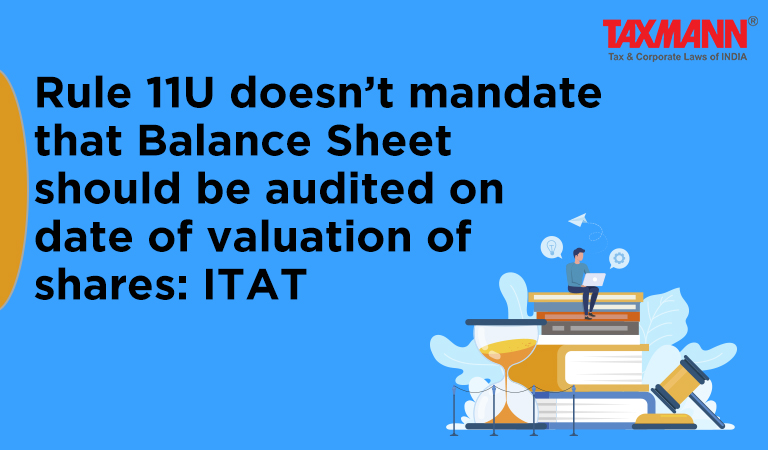Rule 11U doesn’t mandate that Balance Sheet should be audited on date of valuation of shares: ITAT
- Blog|News|Income Tax|
- 3 Min Read
- By Taxmann
- |
- Last Updated on 19 April, 2022

Case Details: Electra Paper and Board (P.) Ltd. v. ITO - [2022] 137 taxmann.com 74 (Chandigarh - Trib.)
Judiciary and Counsel Details
-
- N. K. Saini, Vice President and Vikas Awasthy, Judicial Member
- Rohit Goel, CA for the Appellant.
- Smt. Priyanka Dhar, JCIT-DR for the Respondent.
Facts of the Case
Assessee-company had allotted certain shares at Rs. 20/- (including premium of Rs. 10) to the family members and related group companies on 31-03-2016. During the assessment, the Assessing Officer (AO) issued show cause notice as to why the Fair Market Value (FMV) of shares based on the audited Balance Sheet as of 31/3/2015 not to be adopted under section 56(2)(viib).
The assessee explained that the shares were allotted on 31-3-2016, and hence, the FMV as of 31-3-2016 would be applicable. The AO rejected the contention and determined the FMV of shares based on the financials of the audited Balance Sheet at Rs. 17.32. Consequently, he added the difference between the FMV of shares to the income of asseessee.
On appeal, the CIT(A) upholds the action of the AO. Aggrieved-assessee filed the instant appeal before the Tribunal.
ITAT Held
The Tribunal held that there are two mandatory requirements of rule 11U(b) First, the Balance Sheet should be drawn on the date of valuation, and second, such Balance Sheet should be duly audited. If the Balance Sheet is not drawn on the date of valuation, the Balance Sheet drawn on a date preceding the date of valuation, which has been approved and adopted in the Annual General Meeting of the shareholders, should be considered.
This definition has two limbs; the first limb applies in a situation where the Balance sheet is drawn on the date of valuation. The second limb of the definition applies in a situation where no Balance Sheet is drawn on the valuation date.
In the instant case, the assessee drew a balance sheet on the date of allotment of shares, albeit the said balance sheet was unaudited. The FMV of the shares was determined based on the said balance sheet. The said Balance sheet was subsequently audited, and ostensibly, there was no difference in the financials of the tentative balance sheet drawn on 31-3-2016 after audit by the Auditors.
Since the balance sheet was drawn on the date of valuation, the assessee’s case is covered by first limb of the definition of ‘Balance Sheet’. In so far as the condition that the Balance Sheet should be audited, the said condition is also satisfied as the Balance sheet drawn on 31-3-2016 was subsequently audited with purportedly no change in financials.
The rule does not mandate that the balance sheet should also be audited on the valuation date. Even if the balance sheet is audited subsequently, it would be sufficient to comply with rule 11U(b). Thus, there was no error in adopting the FMV of shares determined by the assessee based on an unaudited balance sheet.
List of Cases Referred to
-
- S. Viji v. CGT [1998] 96 Taxman 474/229 ITR 421 (SC) (para 4.3)
- Vardhman Entertainment and Hospitality (P.) Ltd. v. ACIT [IT Appeal No. 6940 (Mum.) of 2018, dated 1-7-2021] (para 4)
- Sadhvi Securities (P.) Ltd. v. Asstt. CIT [2019] 109 taxmann.com 245/179 ITD 197 (Delhi – Trib.) (para 5)
- Asstt. CIT v. Y. Venkanna Choudary [2019] 112 taxmann.com 71/[2020] 180 ITD 166 (Visakhapatnam – Trib.) (para 5).
Disclaimer: The content/information published on the website is only for general information of the user and shall not be construed as legal advice. While the Taxmann has exercised reasonable efforts to ensure the veracity of information/content published, Taxmann shall be under no liability in any manner whatsoever for incorrect information, if any.

Taxmann Publications has a dedicated in-house Research & Editorial Team. This team consists of a team of Chartered Accountants, Company Secretaries, and Lawyers. This team works under the guidance and supervision of editor-in-chief Mr Rakesh Bhargava.
The Research and Editorial Team is responsible for developing reliable and accurate content for the readers. The team follows the six-sigma approach to achieve the benchmark of zero error in its publications and research platforms. The team ensures that the following publication guidelines are thoroughly followed while developing the content:
- The statutory material is obtained only from the authorized and reliable sources
- All the latest developments in the judicial and legislative fields are covered
- Prepare the analytical write-ups on current, controversial, and important issues to help the readers to understand the concept and its implications
- Every content published by Taxmann is complete, accurate and lucid
- All evidence-based statements are supported with proper reference to Section, Circular No., Notification No. or citations
- The golden rules of grammar, style and consistency are thoroughly followed
- Font and size that’s easy to read and remain consistent across all imprint and digital publications are applied



 CA | CS | CMA
CA | CS | CMA
